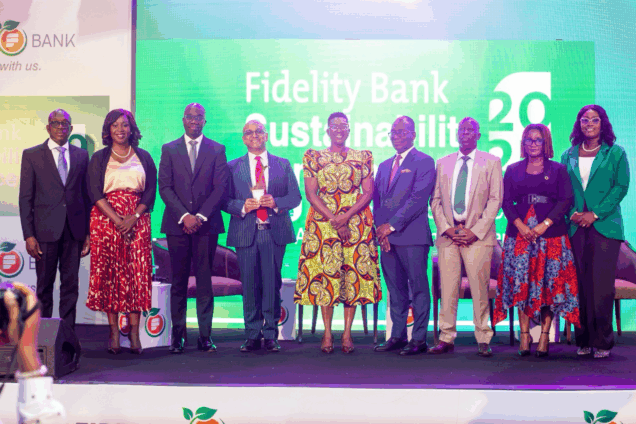Ghana’s path to sustainable development received a major boost at the third edition of the Fidelity Sustainability Conference, where Fidelity Bank showcased the far-reaching impact of its GreenTech Innovation Challenge.
By committing over GH₵1 million into green innovation, the bank has catalyzed more than GH₵13 million in revenue and transformed the lives of over 900 Ghanaians.
This milestone demonstrates how targeted financing in sustainability is no longer an act of corporate social responsibility but a business imperative at the heart of Ghana’s financial system.
The Fidelity Bank GreenTech Innovation Challenge was designed to unlock Ghana’s entrepreneurial potential in the climate space. Through it, entrepreneurs have gained access to capital, mentorship, and networks needed to commercialize solutions such as solar dryers, organic fertilizers, and clean energy systems.
These innovations have not only improved productivity but also addressed urgent environmental challenges. By creating jobs and stimulating revenue streams, the initiative proves that climate action and economic growth can work hand in hand.
Partnerships Driving Impact
Central to this success is collaboration. Fidelity Bank has worked with partners such as Innohub, GrowthAfrica, AfricInvest, Proparco, and IPC, aligning resources to scale impact. The partnerships ensure innovators do not just secure funding but also build sustainable business models that attract further investment.
The bank’s Managing Director, Julian Opuni, emphasized this approach, reiterating Fidelity’s commitment to mobilizing capital where it changes lives, safeguards the planet, and delivers measurable impact.
The conference highlighted that sustainability must extend beyond banking to touch every sector of the economy. Fidelity’s initiatives are creating ripples across transport, agriculture, and energy.
A new electric vehicle financing product is lowering barriers to EV ownership, cutting both fuel costs and emissions. Meanwhile, work on sustainable agriculture financing models and ESG-linked investment products is ensuring that Ghana’s farmers and investors are better prepared for climate shocks.
By embedding climate considerations into its Three-Year Climate Strategy Implementation Plan (2025–2027), Fidelity Bank is setting a precedent for how financial institutions can drive systemic change.
Voices from the Global Stage
The importance of this shift was underscored by Zia Choudhury, United Nations Resident Coordinator in Ghana, who called for a “new love affair” with sustainable finance. He reminded participants that renewable energy consistently outperforms fossil fuels in risk-adjusted returns, proving that climate-smart investments are not just ethical but profitable.
Such global endorsements validate Fidelity’s model of aligning local actions with international standards, including the IFRS S1 and S2 frameworks and the development of a Transition Finance Framework to strengthen Ghana’s credibility in carbon markets.
The conference also celebrated the Orange Inspire Creative Challenge, which supported innovators blending creativity with sustainability. Twenty-five participants underwent an intensive bootcamp, with winners receiving capital and mentorship to scale their ideas.
By targeting both green entrepreneurs and creative innovators, Fidelity is demonstrating a holistic approach—where innovation, inclusion, and climate resilience are mutually reinforcing.
Despite the progress, speakers emphasized that no single institution can achieve Ghana’s climate transition alone. Mobilize private sector capital with urgency and precision if Ghana is to meet its Nationally Determined Contributions (NDCs) under the Paris Agreement.
The conference urged financial institutions, policymakers, and entrepreneurs to collaborate more closely, ensuring that every financing decision contributes to cleaner air, healthier lives, and a resilient economy.
Fidelity Bank plans to strengthen its impact by: Establishing real-time dashboards to track impact metrics for EV financing, ESG products, and GreenTech cohorts; Convening sector-specific roundtables in agriculture, renewable energy, and gender-lens investing; Deepening partnerships on data infrastructure for climate risk modelling; Conducting a mid-term review of its Three-Year Climate Strategy in Q3 of 2025.
Each of these steps reflects a strategic commitment to accountability, innovation, and continuous recalibration of goals.
READ ALSO: NSA Director-General Reassigned, Deputy Takes Over



















